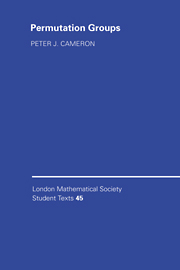Preface
Published online by Cambridge University Press: 06 January 2010
Summary
This book grew from a course I gave at the Euler Institute for Discrete Mathematics and its Applications in the week 10–14 November 1997. The audience were keen to have notes, and so handwritten notes were produced each day. I have corrected and expanded these notes into the present version. The comments, questions and perplexities of the students on the course have been of very great value to me. In particular, they wanted to see proofs of theorems wherever possible, so I have included more proofs than I did in the lectures. Where a proof is too long to explain completely, I have given a sketch which tries to convey the main ideas, or worked a special case. Five chapters correspond to the five days of the course: introduction, character theory, the O'Nan–Scott Theorem, oligomorphic groups, and miscellanea.
Since the course, I have added a chapter on coherent configurations, two sections on computations with permutation groups, and tables of the finite simple groups and the finite 2–transitive groups.
I assume some knowledge of group theory and some mathematical sophistication. When other areas of mathematics (such as probability or logic) are invoked, I have tried not to assume any detailed knowledge: some results can be taken on trust.
The choice of topics is a bit idiosyncratic; this is not a complete treatment of the subject. Other topics which might have been chosen, and further details of those which do appear, are given in the references. For about thirty years, the only general reference on permutation groups was Helmut Wielandt's influential book.
- Type
- Chapter
- Information
- Permutation Groups , pp. ix - xPublisher: Cambridge University PressPrint publication year: 1999



